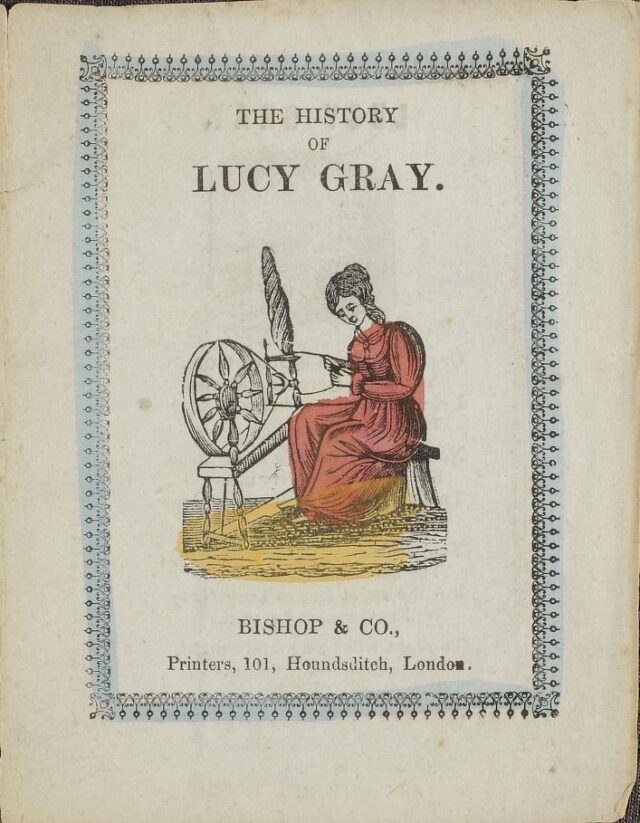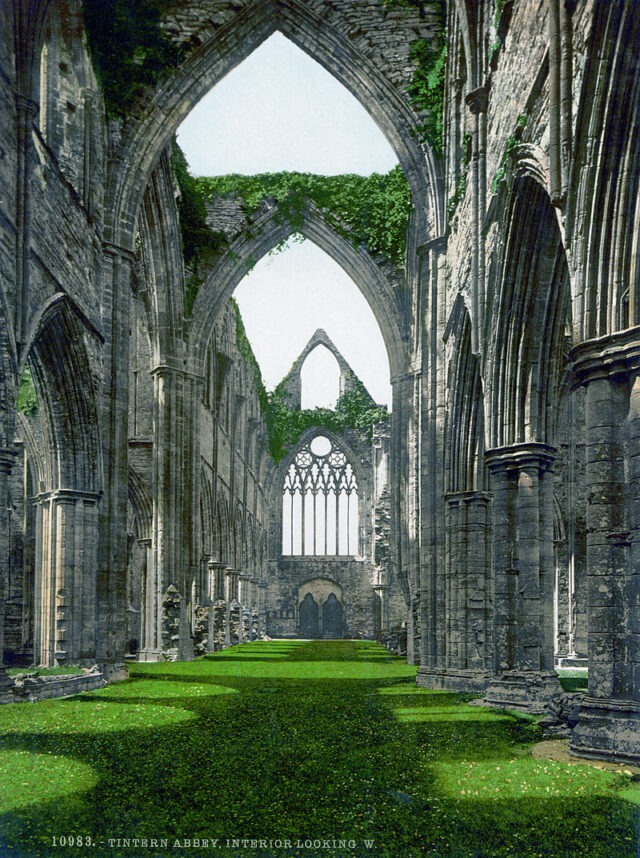From The Wall Street Journal:
It’s time to celebrate the great Romantic poet William Wordsworth, born 250 years ago in a picturesque market town in northern England. One way to size up his achievement is to venture backward, beginning in the present day and drifting past the postmodernists, the modernists, the Edwardians, the Victorians, until we finally reach Wordsworth, who for all his distance seems a kindred soul. We “get” him. Ours is an age rich in self-reflection and memoir writing, hospitable to a poet who chose himself as his primary subject. Wordsworth’s masterpiece, “The Prelude,” an endlessly revised unrhymed poem of 13 books that was never published in his lifetime, is often called the finest 19th-century English autobiography.
Another way—a better way—to size up Wordsworth is to begin some 250 years before his birth and march forward: Along the way, you encounter Spenser’s “Faerie Queen” and Shakespeare, Donne and the Metaphysicals, Pope and the Augustans, and none of these prepares you, quite, for Wordsworth. You don’t get him at all. Pursuing him in this fashion, you behold how singular his feats were as he examined how the “infant sensibility, / Great birth-right of our Being, was in me / Augmented and sustained.”
“Radical Wordsworth” is the title of Jonathan Bate’s appealing new biography. Its chief concern is young Wordsworth, who was indeed politically radical, though a staunch conservative later in his long life. (Of the major Romantic poets—a tragically short-lived lot—only Wordsworth entered the reign of Victoria, who appointed him poet laureate in 1843, seven years before his death.) Young William’s imagination was inflamed by the French Revolution. He sojourned in France during a tumultuous stretch (1791-93), consorting with revolutionaries while fathering a child out of wedlock. Returning alone to England, he watched with dismay and disbelief as France’s ever-growing danse macabre skidded and slipped in a pool of blood.
But Mr. Bate’s radical focus is less political than literary. He illuminates Wordsworth’s poetic originality, beginning with the introducing (or reintroducing, after a century dominated by courtly verse) of an often rural plainspokenness. Wordsworth’s goal, as he stiffly put it, was “to ascertain how far the language of conversation in the middle and lower classes of society is adapted to the purposes of poetic pleasure.” It’s a voice one hears in “The Solitary Reaper” and “The Ruined Cottage” and “A Slumber Did My Spirit Seal” and so many other anthology pieces.
Link to the rest at The Wall Street Journal

She dwelt among the untrodden ways
Beside the springs of Dove,
A Maid whom there were none to praise
And very few to love:A violet by a mossy stone
Half hidden from the eye!
—Fair as a star, when only one
Is shining in the sky.She lived unknown, and few could know
William Wordsworth, She Dwelt Among the Untrodden Ways, Stanza II, 1798
When Lucy ceased to be;
But she is in her grave, and, oh,
The difference to me!


Five years have passed; five summers, with the length
Of five long winters! and again I hear
These waters, rolling from their mountain-springs
With a sweet inland murmur. —Once again
Do I behold these steep and lofty cliffs,
Which on a wild secluded scene impress
Thoughts of more deep seclusion; and connect
The landscape with the quiet of the sky.
The day is come when I again repose
Here, under this dark sycamore, and view
These plots of cottage-ground, these orchard-tufts,
Which, at this season, with their unripe fruits,
Among the woods and copses lose themselves,
Nor, with their green and simple hue, disturb
The wild green landscape. Once again I see
These hedge-rows, hardly hedge-rows, little lines
Of sportive wood run wild; these pastoral farms
Green to the very door; and wreathes of smoke
Sent up, in silence, from among the trees,
With some uncertain notice, as might seem,
Of vagrant dwellers in the houseless woods,
Or of some hermit’s cave, where by his fire
The hermit sits alone.Though absent long,
These forms of beauty have not been to me,
As is a landscape to a blind man’s eye:
But oft, in lonely rooms, and mid the din
Of towns and cities, I have owed to them,
In hours of weariness, sensations sweet,
Felt in the blood, and felt along the heart,
And passing even into my purer mind
With tranquil restoration:—feelings too
Of unremembered pleasure; such, perhaps,
As may have had no trivial influence
On that best portion of a good man’s life;
His little, nameless, unremembered acts
Of kindness and of love. Nor less, I trust,
To them I may have owed another gift,
Of aspect more sublime; that blessed mood,
In which the burthen of the mystery,
In which the heavy and the weary weight
Of all this unintelligible world
Is lighten’d:—that serene and blessed mood,
In which the affections gently lead us on,
Until, the breath of this corporeal frame,
And even the motion of our human blood
Almost suspended, we are laid asleep
In body, and become a living soul:
While with an eye made quiet by the power
Of harmony, and the deep power of joy,
We see into the life of things.If this
Be but a vain belief, yet, oh! how oft,
In darkness, and amid the many shapes
Of joyless day-light; when the fretful stir
Unprofitable, and the fever of the world,
Have hung upon the beatings of my heart,
How oft, in spirit, have I turned to thee
O sylvan Wye! Thou wanderer through the woods,
How often has my spirit turned to thee!And now, with gleams of half-extinguish’d thought,
William Wordsworth, Lines Composed a Few Miles above Tintern Abbey, On Revisiting the Banks of the Wye during a Tour, July 13, 1798
With many recognitions dim and faint,
And somewhat of a sad perplexity,
The picture of the mind revives again:
While here I stand, not only with the sense
Of present pleasure, but with pleasing thoughts
That in this moment there is life and food
For future years. And so I dare to hope
Though changed, no doubt, from what I was, when first
I came among these hills; when like a roe
I bounded o’er the mountains, by the sides
Of the deep rivers, and the lonely streams,
Wherever nature led; more like a man
Flying from something that he dreads, than one
Who sought the thing he loved. For nature then
(The coarser pleasures of my boyish days,
And their glad animal movements all gone by,)
To me was all in all.—I cannot paint
What then I was. The sounding cataract
Haunted me like a passion: the tall rock,
The mountain, and the deep and gloomy wood,
Their colours and their forms, were then to me
An appetite: a feeling and a love,
That had no need of a remoter charm,
By thought supplied, or any interest
Unborrowed from the eye.—That time is past,
And all its aching joys are now no more,
And all its dizzy raptures. Not for this
Faint I, nor mourn nor murmur: other gifts
Have followed, for such loss, I would believe,
Abundant recompence. For I have learned
To look on nature, not as in the hour
Of thoughtless youth, but hearing oftentimes
The still, sad music of humanity,
Not harsh nor grating, though of ample power
To chasten and subdue. And I have felt
A presence that disturbs me with the joy
Of elevated thoughts; a sense sublime
Of something far more deeply interfused,
Whose dwelling is the light of setting suns,
And the round ocean, and the living air,
And the blue sky, and in the mind of man,
A motion and a spirit, that impels
All thinking things, all objects of all thought,
And rolls through all things. Therefore am I still
A lover of the meadows and the woods,
And mountains; and of all that we behold
From this green earth; of all the mighty world
Of eye and ear, both what they half-create,
And what perceive; well pleased to recognize
In nature and the language of the sense,
The anchor of my purest thoughts, the nurse,
The guide, the guardian of my heart, and soul
Of all my moral being.
Nor, perchance,
If I were not thus taught, should I the more
Suffer my genial spirits to decay:
For thou art with me, here, upon the banks
Of this fair river; thou, my dearest Friend,
My dear, dear Friend, and in thy voice I catch
The language of my former heart, and read
My former pleasures in the shooting lights
Of thy wild eyes. Oh! yet a little while
May I behold in thee what I was once,
My dear, dear Sister! And this prayer I make,
Knowing that Nature never did betray
The heart that loved her; ’tis her privilege,
Through all the years of this our life, to lead
From joy to joy: for she can so inform
The mind that is within us, so impress
With quietness and beauty, and so feed
With lofty thoughts, that neither evil tongues,
Rash judgments, nor the sneers of selfish men,
Nor greetings where no kindness is, nor all
The dreary intercourse of daily life,
Shall e’er prevail against us, or disturb
Our chearful faith that all which we behold
Is full of blessings. Therefore let the moon
Shine on thee in thy solitary walk;
And let the misty mountain winds be free
To blow against thee: and in after years,
When these wild ecstasies shall be matured
Into a sober pleasure, when thy mind
Shall be a mansion for all lovely forms,
Thy memory be as a dwelling-place
For all sweet sounds and harmonies; Oh! then,
If solitude, or fear, or pain, or grief,
Should be thy portion, with what healing thoughts
Of tender joy wilt thou remember me,
And these my exhortations! Nor, perchance,
If I should be, where I no more can hear
Thy voice, nor catch from thy wild eyes these gleams
Of past existence, wilt thou then forget
That on the banks of this delightful stream
We stood together; and that I, so long
A worshipper of Nature, hither came,
Unwearied in that service: rather say
With warmer love, oh! with far deeper zeal
Of holier love. Nor wilt thou then forget,
That after many wanderings, many years
Of absence, these steep woods and lofty cliffs,
And this green pastoral landscape, were to me
More dear, both for themselves, and for thy sake.
I preferred Keats and Coleridge to Wordsworth, though not for any very creditable reasons. I was lucky enough to go to a school which spent so much time stuffing me full of science and mathematics that I missed out on almost all the forced reading of “classics” that put many off of reading for the rest of their lives.
As for Wordsworth, I much prefer the conservative patriot who donned the uniform of the Grasmere Volunteers ready to face a French invasion to the young political radical.
Above are my two favorite lines from “Ode on Immitations of Immortality . . . ”
At least, when I was a young lad. Now, well . . .
Here’s the whole [long] Wordsworth poem:
https://poets.org/poem/ode-intimations-immortality-recollections-early-childhood
I had to study The Prelude for ‘A’ level English Literature at school. And I concluded Wordsworth was a tedious old bore. Tell me, did any of you actually read that extract above, or did your mind shy away from it? In my opinion, the pictures easily beat his thousand words.
Lexi – I actually read the entire text of Tinturn Abbey and provide a line-by-line detailed analysis of both the words and prosody of the poem for a paper I wrote in college. It was a very long paper, but the process confirmed, for me (at the time) that Wordsworth was a poetic genius equaled by few and surpassed by none.
That said, I admit that I went overboard by including the entire text of the poem in a blog post. I also agree that the photos are more engaging on the screen than the poem is.
As long as I’m in an admitting state of mind, I will admit further that I don’t remember anything of note from the paper, although I think I received an A and, at the time, believed the paper to be a work of sublime genius (although not on the same scale as the poem, of course).
I’m impressed. Maybe I just don’t get Wordsworth. I have a similar problem with Mozart (apart from the Requiem) and since musical people think he’s the bee’s knees, I know that must be something lacking in me.
Though I have to admit (it’s catching) that in my novels, it’s a warning sign if a character loves Mozart.
Well, you have to remember that Mozart wrote pop music.
Catchy earbug stuff, like that “night music” trifle.
He was almost as bad as the Strauss guy, with his dance hall pieces.
Salieri had ample reason to despise the brat. 😉